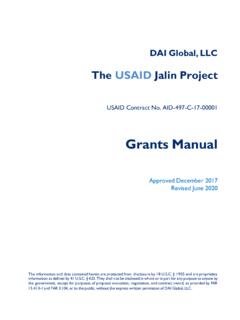Transcription of How to note - GOV.UK
1 How to noteA DFID practice paper DECEMBER 2010 Finance & Corporate Performance Division 1 PUBLICATION NOTE: (added March 2011) This how to note was prepared as an internal document to guide DFID staff in the drafting of Operational Plans. It covers some sections of Operational Plans which are not being published because of their sensitive nature or because they are only meaningful for internal management purposes. Preparing an Operational Plan What is the purpose of an Operational Plan? Operational Plans should outline the role each unit plays in delivering the DFID Business Plan.
2 The Operational Plans will collectively provide the necessary detail of how we will implement the Business Plan and enable the central aggregation, monitoring and management to ensure delivery. DFID's Business Plan for 2011-15 has now been agreed by HM Treasury, Number 10 and the Cabinet Office. The Business Plan was published on 8 November 2010. Operational Plans will be the single layer of planning across the organisation below the DFID Business Plan. They will translate the outcomes of the Spending Review 2010 as well as the Bilateral Aid Review (BAR), Multilateral Aid Review (MAR) and Humanitarian Emergency Response Review (HERR) processes, into plans that set out the operations of different units of DFID for the next four years.
3 Operational Plans should provide confidence to the unit and to management that financial and human resources are organised to deliver the results they have committed to, and that they have developed plans to implement DFID s agendas on Value for Money, Evaluation and Transparency. The plans are internal management tools, but some sections will be made available publicly (see below). What is an operational unit? Director Generals are responsible for determining the appropriate level for operational planning in their Directorates. For Country Programmes the operational unit is usually the country office (or regional programme).
4 For International and Policy divisions the operational unit is the department. Corporate Performance Group is deemed to be a single operational unit. For the full list of operational units see Quest Document 2866154: List of units completing OPs by Directorate. What should an Operational Plan include? The allocation process and the Reviews will provide units with the overall shape of their programme. Operational Plans will concisely set out: Why the operational unit is important in delivering DFID s objectives What the operational unit will deliver in terms of SRP actions and results (a summary will be provided in the body of the OP and a full Results Framework must be annexed) How the operational unit will deliver these results including summary resource requirements, contributions to DFID efficiency targets and business change objectives More detail is provided later in this guidance.
5 This guidance is not intended to cover all the planning processes that will be necessary to inform the Operational Plans: it focuses on what units need to include in their Operational Plans. Links will be provided where other relevant guidance exists to the planning processes that will inform the writing of the Operational Plan. Operational Plans are not intended to be exhaustive and will not cover the full extent of all work undertaken by individual operational units. Appropriate planning and monitoring arrangements below the operational plan level should be determined by operational unit heads.
6 Relevant processes should be proportionate and ensure a clear line of sight to the Operational Plan and DFID Business Plan. What is the timetable for developing Operational Plans? Operational Plans must be signed-off and submitted by mid-February 2010. The process for obtaining sign-off for the Operational Plans will be determined by individual Directorates and will be communicated to operational units by their Director or DG. After sign-off, there will be a process of central review both to ensure that the results sections are consistent with any aggregate statements of DFID delivery and that any derived reporting against the plan will help meet external reporting requirements.
7 We will also need to ensure that the individual budget and workforce sections are within overall organisational constraints. Quality assurance for the remaining sections (1, 2, 6-10) will primarily lie with the Directors/DG responsible for signing-off the OPs. What is the process for consulting on Operational Plans? It is up to individual operational units to decide if and how to consult with other internal and external partners when developing its Plan. Country offices may wish to consult, for example, with partner governments and other key stakeholders. Will Operational Plans be revised?
8 In line with DFID s own Business Plan, Operational Plans will be refreshed annually. We do not envisage full scale revision over the spending review period except where 2 there is major external change, but we recognise that detailed information for the outer years of the current settlement may not be available at the outset. How will we monitor and report progress against our Operational Plans? We will be developing a formal monitoring framework for measuring progress against plans from April 2011. Our working assumption is that this will follow the broad outline of the current quarterly management report but with an enhanced results section to measure progress against DFID s business plan indicators and any formal public statements of aggregate results.
9 We will also continue to track a range of common key performance indicators drawn primarily from central systems to help measure operational efficiency and measure progress towards business change objectives. Operational units should also ensure regular monitoring and reporting against their own detailed results frameworks or equivalent Will Operational Plans be evaluated? A proportion of Operational Plans will be evaluated. Further details on how the OPs subject to evaluation will be selected and the method of evaluation will be issued in due course. Teams should also be aware of the new context DFID is working in, in particular the creation of the Independent Commission for Aid Impact (ICAI).
10 In section 7 Operational Plans will cover the work units are doing to embed evaluation in their own work, and how they will evaluate their projects and programmes over the lifespan of the OP. Will Operational Plans be published? In the spirit of transparency, and to comply with related requirements, all Operational Plans will be published. They are primarily intended for use in internal management not as public-facing documents, but when drafting the OP units should keep in mind that they will be made publicly available. We propose that some sections be withheld or restricted and these are indicated on the attached template.
















